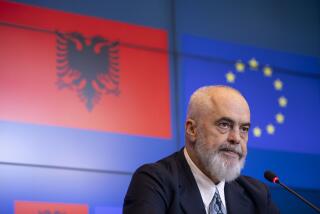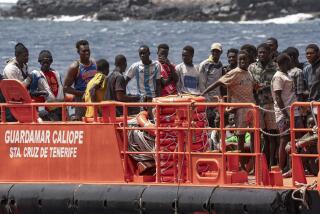Macedonia Shuts Border, Stranding Terrified Refugees
- Share via
BLACE, Macedonia — In a surprise move, Macedonian officials abruptly shut the border to newly arriving refugees from Yugoslavia late Wednesday, demanding that other nations do more to pay for the Balkan crisis.
Interior Ministry officials said that, from now on, they will allow into Macedonia each day only as many Kosovo Albanian refugees as are evacuated out of their country to other nations.
U.N. officials were stunned by the closure, which they said forced at least 1,000 refugees back into Yugoslavia. One U.N. official reported seeing Serbian police officers beating refugees with batons.
“We’re very worried,” said Paula Ghedini, a spokeswoman for the Office of the U.N. High Commissioner for Refugees. “Those people are fleeing because they’re afraid for their lives.”
But Macedonian officials said they could not accept any more refugees without endangering the country’s economic, political and social fabric. More than 200,000 ethnic Albanian refugees have entered the country, according to government figures, a number greater than 10% of Macedonia’s population.
Refugees have been flooding into Macedonia at a rate of about 10,000 a day for the past two days, according to U.N. relief officials, while only about 1,000 refugees a day are being transported to other countries for resettlement.
While some observers privately predicted that the new limitation will crumble under international pressure, U.N. officials feared a potentially disastrous backlog within days.
“No more refugees can enter Macedonia until the UNHCR [Office of the U.N. High Commissioner for Refugees] and other countries live up to their promises,” said Stevo Pendarovski, head of research for the Interior Ministry. “Europe must react immediately. We are on the brink of an explosion in Macedonia.”
Macedonian officials last month shut a border crossing for 24 hours while demanding that the international community do more to aid refugees.
If Macedonian officials remain firm on limiting the flow of refugees, the impact would be felt throughout the Balkans. Even more refugees probably would stream into neighboring Albania, Europe’s poorest country, which has already accepted an estimated 400,000 refugees fleeing the fighting in Kosovo, a province of Serbia, Yugoslavia’s dominant republic. And the refusal could have an impact on internal Macedonia politics, which are carefully balanced between ethnic Macedonians and Albanian Macedonians.
The surprise border closure follows promises over the last few days from several nations to do more to help Macedonia. The British and French prime ministers came to the country bearing pledges of more aid, as did the Japanese and Canadian foreign ministers.
In addition, Macedonia won assurance of $252 million from the World Bank, the International Monetary Fund and other donors after an emergency meeting Wednesday in Paris, and a promise to try to increase that to $400 million later in the year.
Pendarovski dismissed such promises, saying that no money has yet arrived. “They are words and phrases. Nothing has happened,” he said.
Wednesday’s closure began about 5 p.m., as U.N. officials were interviewing about 1,000 refugees waiting to enter Macedonia.
Macedonia police suddenly started directing the refugees back into Kosovo, said Astrid van Genderen Stort, a U.N. field officer who was with the refugees.
Once the refugees were back on the Yugoslav side of the border, Van Genderen Stort said, she saw Serbian border guards hit some of the Kosovars with batons.
“These people were completely scared. There was absolute fear,” she said.
The refugees were taken away from the border area and farther into Yugoslavia about 7 p.m., disappearing around a bend in the road.
When other U.N. officials arrived, they were told by a local police commander that the border was open. However, there was no sign of the 1,000 refugees.
By 9 p.m., there was no sign of the thousands of ethnic Albanians who mass in the area on an almost hourly basis.
Reuters news service contributed to this report.
More to Read
Sign up for Essential California
The most important California stories and recommendations in your inbox every morning.
You may occasionally receive promotional content from the Los Angeles Times.













